
By Mosaic Foundation
Peace, Trust, and Cooperation: Towards Regional Integration
As the world grapples with mounting geopolitical uncertainty, the Central Asian states, now well into the third decade of their independence, stand at a pivotal crossroads. Yet Greater Central Asia’s broader identity is deeply rooted in a centuries-old tradition of intercultural exchange, intellectual collaboration, and a celebration of unity in diversity.
At Mosaic, we define “Greater Central Asia” to include the five Central Asian republics, along with Afghanistan and the Caucasus—an integral part of the Persianate world. Recognising the geopolitical shifts and the power of intercultural dialogue to foster peace and cooperation across South, Central, and West Asia and the Caucasus has never been more urgent.
In acknowledgment of this imperative, the United Nations General Assembly adopted a resolution in July 2022 declaring Central Asia a Zone of Peace, Trust, and Cooperation. The resolution reaffirms the essential role of regional integration, shared heritage and prosperity, historical continuity, and cultural dialogue in shaping the region’s future. Its message aligns closely with the intellectual legacy of Muhammad Osimi, whose lifelong commitment to diversity, pluralism, and cooperation strongly echoes Mosaic Foundation’s mission.
Mosaic is committed to rekindling the region’s shared Turco-Persian heritage to foster interconnectedness through cultural and intellectual initiatives aimed at shaping a more integrated and inclusive future for the entire region. This is in congruence with the region being the meeting point of different civilisations, trade hubs and place of convergence of different thoughts.
Muhammad Osimi: Celebrating a Legacy
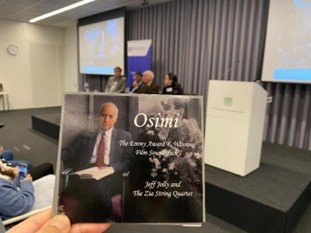 In recognition of Muhammad Osimi’s enduring relevance—a man who spent his life nurturing intercultural understanding and championing a shared civilisational heritage—Mosaic recently hosted two landmark events exploring the contemporary resonance of his ideas.
In recognition of Muhammad Osimi’s enduring relevance—a man who spent his life nurturing intercultural understanding and championing a shared civilisational heritage—Mosaic recently hosted two landmark events exploring the contemporary resonance of his ideas.
Spearheaded by Dr Dagikhudo Dagiev member of Mosaic’s Board of Advisors and senior researcher at the Institute of Ismaili Studies (IIS) in London and Mr Zalmai Nishat, Founder and Executive Chair of Mosaic, the events were organised in collaboration with the Osimi Foundation and acclaimed American filmmaker Chris Schueler, whose documentary “Osimi” served as the centrepiece of both gatherings.
London Roundtable at the Institute of Ismaili Studies
On 17 February 2025, the IIS in London hosted “Central Asia, Afghanistan and the Caucasus as a Zone of Peace and Cooperation: Documentary Screening and Roundtable on Muhammad Osimi.”
The evening began with a screening of “Osimi,” a documentary directed by Chris Schueler, which poignantly captured the intellectual contributions of Muhammad Osimi—his advocacy for unity in diversity, the transformative power of education, and the necessity of regional cooperation.
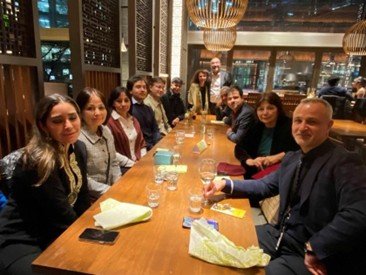
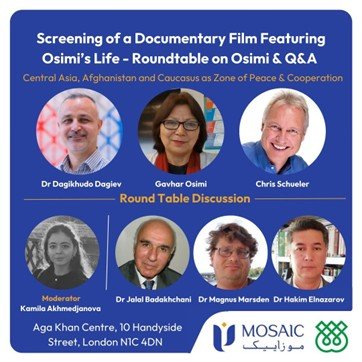
The film was followed by a dynamic roundtable, where leading scholars and experts reflected on how Osimi’s legacy informs present-day efforts to build inclusive and cooperative societies across historically connected regions.
Speakers included Dr Jalal Badakhchani, a friend of Osimi and respected scholar; Professor Magnus Marsden, Chair Department of Anthropology at the University of Sussex; and Dr Hakim Elnazarov, senior researcher at the IIS. The roundtable was moderated by Miss Kamila Akhmedjanova, PhD candidate at the University of Oxford. Opening remarks were delivered by Dr Dagiev, with further reflections from Chris Schueler and Ms Gavhar Osimi of the Osimi Foundation.
A central theme that emerged was the enduring influence of the Turco
-Persian civilisation—a cultural matrix that has long provided the intellectual scaffolding for regional unity and peaceful coexistence.
King’s College, Cambridge: A Forum of Ideas
Just two days later, hosted by Dr Gillian Tett, the Provost at King’s College, Cambridge, a second event was held on 19 February 2025. Dr Tett opened the evening with welcoming remarks, followed by a keynote from Sir Laurie Bristow, former UK ambassador to Russia, Azerbaijan, and Afghanistan and current President of Hughes Hall, Cambridge.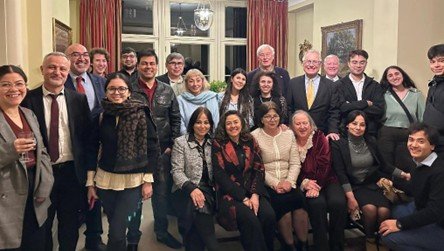
The panel once again centred on the “Osimi” documentary, complemented by a rich roundtable discussion. Participants included Dr Yahia Baiza (IIS), Dr Dagikhudo Dagiev (IIS and Mosaic), and Miss Kamila Akhmedjanova (Oxford). The session was chaired by Mr Zalmai Nishat, the Executive Chair of Mosaic Foundation.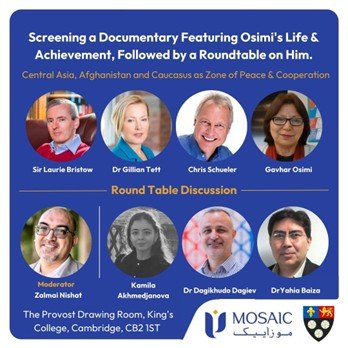
Contributors also included Chris Schueler, Ms Gavhar Osimi, Professor Charles Melville (Emeritus Professor of Persian History, Cambridge), and Dr Firuza Melville (Director of Research, Cambridge Shahnama Centre for Persian Studies). Their insights underscored the profound potential for Osimi’s legacy to inspire contemporary movements toward peaceful, pluralistic regionalism.
Mosaic’s Vision for Intercultural Dialogue and Regional Integration
More than just a tribute to Osimi, these events reflected Mosaic’s broader vision: a world where diversity is celebrated, equality upheld, and shared prosperity pursued through rooted cultural values and collective memory.
Drawing on the traditions of pluralism and social justice embedded in the Persianate world and Eastern Islamic civilisations, Mosaic’s work champions sustainable peace and inclusive progress.
At a time when civil society engagement is increasingly central to diplomacy and development, the UN’s Zone of Peace resolution affirms the importance of trust, multilateralism, and a people-centred approach to regional cooperation. It is exactly here that Mosaic embarks its intercultural dialogue at the Heart of Asia.
Mosaic continues to play a catalytic role in advancing this agenda—not only as an advocate for education, human dignity, and cultural preservation and multiculturalism, but also as a convenor between policy leaders, scholars, and grassroots actors. Its focus on dialogue, historical recovery, and regional connectivity and integration ensures that the aspirations of a new generation striving for peace and pluralism are carried forward with vision and resolve.
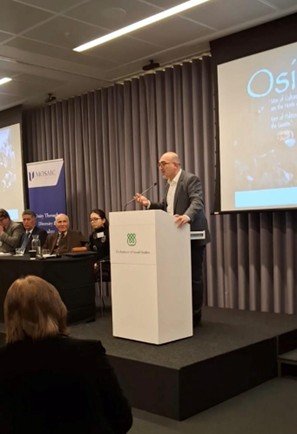
Peace, Trust, Cooperation: A Blueprint for Greater Central Asia
Viewed through the lens of Osimi’s legacy, the UN resolution, and Mosaic’s own work, these gatherings offer a compelling roadmap for peace in Greater Central Asia. They highlight the transformative power of dialogue and shared knowledge in healing divides, strengthening solidarity, and reimagining a united regional future.
As Mosaic expands its reach, its commitment to justice, harmony, and thoughtful integration remains steadfast.
A Note of Gratitude
These landmark events would not have been possible without the steadfast support of the Osimi Foundation, based in the United States. Their dedication to preserving Muhammad Osimi’s legacy and advancing dialogue across borders has been instrumental. Therefore, our thanks go to Ms Gavhar Osimi, whose continued engagement infused the events with meaning and emotional resonance.
Dr Gillian Tett, the Provost at King’s College and Sir Laurie Bristow, the President of Hughes Hall, Cambridge, remain steadfast supporters of Mosaic Foundation’s imitative and we would like to extend our special thanks to them.
Social media links:
https://x.com/MosaicGFdn/status/1891541849979932987
https://x.com/MosaicGFdn/status/1891053852612239766
https://www.linkedin.com/feed/update/urn:li:activity:7298039539527213056
https://www.linkedin.com/feed/update/urn:li:activity:7297314743957024771
